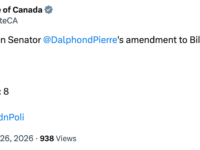Faced with a bill that would leave political parties subject to weaker privacy rules than virtually any other major organization in Canada, the Senate voted yesterday to amend the bill by including a sunset clause on the privacy provisions that gives that the government three years to come up with something better. The change is designed to allow the new rules, which as the Senate heard repeatedly from experts and privacy commissioners are not real privacy rules at all, to apply immediately but expire in three years. This will have the effect of killing a B.C. privacy challenge that sparked the legislation in the first place. The bill heads back to the House of Commons, where the government can either accept the change and have the bill pass or reject the change and send it back again to the Senate. If it is sent back, the Senate is unlikely to oppose the privacy elements in the bill again.
 Articles by: Michael Geist
Articles by: Michael Geist
The Law Bytes Podcast, Episode 258: Jaxson Khan With an Insider Perspective on AI Policy Development in Canada
Earlier this month, the government quietly released a “what we heard” report this discussing the response to its 30-day sprint AI consultation from last October. The consultation was promoted as giving Canadians – including a 28 person expert advisory board – the chance to provide their views on AI as the AI Minister Evan Solomon works toward a national AI strategy. The consultation garnered some criticism for its speed and missing perspectives on the expert panel. More recently on the use of AI to assess the results have sparked further doubts about it.
Jaxson Khan is the CEO and Founder of Aperature AI and a Senior Fellow at the Munk School of Global Affairs and Public Policy at the University of Toronto. But before that, he served as Senior Policy Advisor the Minister of Innovation Science and Industry, where AI was one of his lead responsibilities. Jaxson joins the Law Bytes podcast to provide an insider perspective on AI policy development along with his thoughts on the AI consultation and its results.
Time for the Government to Fix Its Political Party Privacy Blunder: Kill Bill C-4’s Disastrous Privacy Rules
Just weeks after last year’s election, Mark Carney’s government committed not one, but two privacy blunders in rapid succession. First, Bill C-2 – literally the first substantive bill of the new government – buried lawful access provisions in an omnibus “border measures” bill that would have established unprecedented warrantless access to the personal of information of Canadians. Second, days later it introduced Bill C-4, which was framed as affordability measures bill but included provisions that exempt political parties from the application of privacy protections. The bizarre assault on privacy felt like an opportunistic attempt to insert unpopular rules in the hope that few were paying attention. The strategy was failure: the government ultimately introduced a new border measures bill with lawful access removed (new lawful access rules are expected in their own bill this year) and now a Senate committee which studied the Bill C-4 privacy rules has recommended that they be killed, removed from the bill, or subject to a two-year sunset clause.
The Law Bytes Podcast, Episode 257: Lisa Given on What Canada Can Learn From Australia’s Youth Social Media Ban
Social media bans for younger users have begun to take hold in various countries, particularly in Europe. In Canada, Bill S-209 may ostensibly be about underage access to pornography sites, but the bill’s proponents seem positively giddy at the prospect of a broader application to social media. This trend started in Australia, which passed a social media ban for those under 16 in late 2024 with the law taking effect just a couple of months ago.
Lisa Given is the Distinguished Professor of Information Sciences at the Royal Melbourne Institute of Technology or RMIT in Melbourne, Australia. She has been closely tracking and commenting on the Australian legislation and she joins the Law Bytes podcast to discuss its origins, how the law functions, the concerns it has raised, and what lessons Canada might draw from the experience to date.
Court Ordered Social Media Site Blocking Coming to Canada?: Trojan Horse Online Harms Bill Clears Senate Committee Review
Critics of Senator Julie Miville-Dechêne’s successive bills that ostensibly target pornography sites have for years warned of the privacy and equity risks that arise from mandated age verification and the dangers of over broad legislation that would extend far beyond pornography sites by covering social media, search, and AI services. The Senate committee reviewing the latest iteration of those bill – Bill S-209 – met yesterday to conduct a clause-by-clause review of the bill. That the bill passed through committee pending some supplementary remarks was not a surprise. However, that the privacy and equity concerns barely merited a mention and that regulating social media sites was viewed as feature not a bug was a wake up call.











